One might expect that, in this globalized world, noteworthy books in one region would soon attract publishers elsewhere, especially in regions that happen to share a language. Not so. In the case of the United States and the United Kingdom, for example, some books are published only in the UK, others only in the US. 1
It can be frustrating to have heard of an interesting book, to want to read that book, and to find that it is available ONLY in an imported edition. Well, at least it’s available (failing a breakdown in global trade networks, and how likely is that)…but it may take longer to get the book and the book may be more expensive.
You may be wondering why I am vexed about this. Allow me to list a few books that I wanted to acquire and that were not available in North American editions, as far as I can tell.
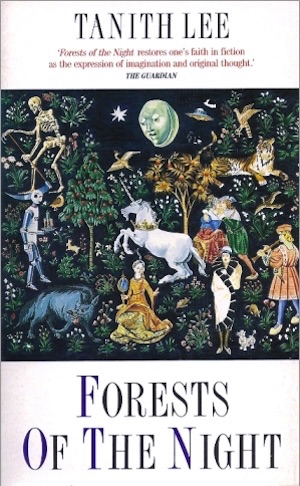
Tanith Lee’s 1989 Forests of the Night. My second favourite Lee collection (after Red as Blood, published in 1983), it contains a selection of the author’s shorter works, accompanied with epigrammatic, allusive introductions. All of Lee’s dark, gothic talents are on display in this collection, but, unless you live in the UK, obtaining a copy could be difficult. Still, what’s a life without dreams?
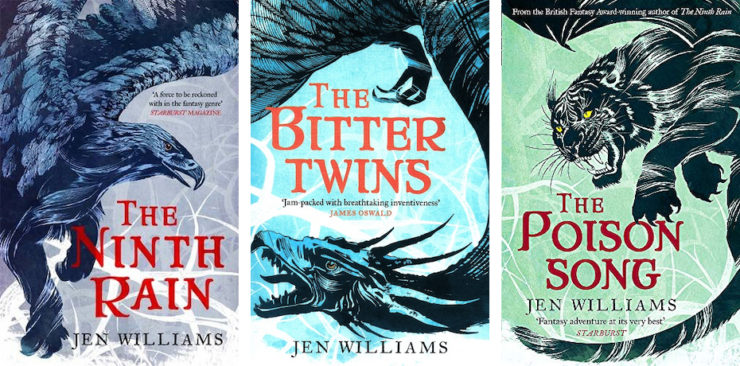
A more recent series that comes to mind is Jen Williams’ The Winnowing Flame trilogy: The Ninth Rain (2017), The Bitter Twins (2018) and The Poison Song (2019). I was unfamiliar with the series (and indeed, the author) when a patron commissioned a review. However, a cursory glance at the ISFDB entry left me confident that acquiring copies would be trivial. After all, The Ninth Rain won a British Fantasy Award! Cue bitter laughter. In the end I had to import copies directly from the UK.
The Winnowing Flame is a secondary world fantasy about a realm on the precipice of disaster. The Jure’lia have staged attempted invasion after attempted invasion, but the god-touched Eborans have always managed to protect their world. The most recent invasion ended with the Eboran tree-god dead; in the following decades, the Eborans have weakened considerably and may not be able to resist another invasion. It’s up to Lady Vincenza “Vintage” de Grazon, action archaeologist, and her companions to unravel Jure’lia mysteries and so save their world from conquest.
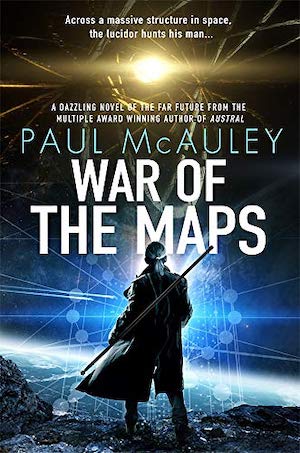
Paul McAuley is another award-winning author whose work can be curiously difficult to acquire in North America. The most recent example is his engrossing War of the Maps (2020), which is set billions of years in the future, on a vast structure that surrounds the burned-out remnants of our sun. The godlike beings who created this magnificent artifact are gone but their works survive. Unfortunately for the mortals, so too do some of the godlike tools—tools that are just the sort of thing an ambitious evil genius might exploit. The lucidor is determined to protect his world from just such a genius. To do so he must first find his quarry, somewhere on a disunited world many times the size of Earth.
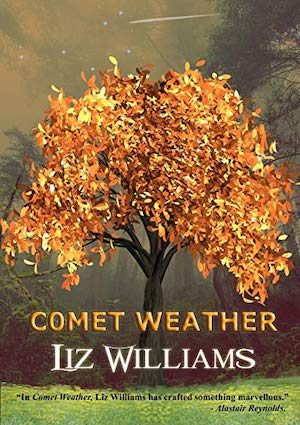
Liz Williams’ 2020 Comet Weather. For the rest of the world, the approach of Lerninsky’s Comet is merely an interesting astronomical oddity. The Fallow sisters live in a world where ghosts can be familiar companions, where the celestial stars can manifest as beautiful women, where otherworldly realms are just around the corner. A year earlier, their mother Alys vanished. It was a mystery the sisters never solved. Now they face another problem: can they figure out what’s happening in time to save the world?
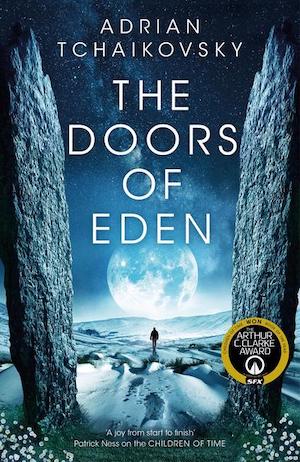
Adrian Tchaikovsky’s 2020 The Doors of Eden (winner of an Arthur C. Clarke award) begins with an innocent monster hunt on Bodmin Moor. Two girls went out; one returned. Four years later, the missing girl reappears, just in time to save a brilliant researcher from a gang of racists. Where has the missing girl been? What followed her home? And why does this researcher, and her esoteric theory, matter so much? Theoretical physics becomes immediate reality in this multiverse thriller.
* * *
No doubt you too are aware of intriguing works that have yet to find a publisher on this side of the pond. Feel free to mention them in comments…
In the words of Wikipedia editor TexasAndroid, prolific book reviewer and perennial Darwin Award nominee James Davis Nicoll is of “questionable notability.” His work has appeared in Publishers Weekly and Romantic Times as well as on his own websites, James Nicoll Reviews and Young People Read Old SFF (where he is assisted by editor Karen Lofstrom and web person Adrienne L. Travis). He was a finalist for the 2019 Best Fan Writer Hugo Award and is surprisingly flammable.
[1]It used to be that Canadian bookstores stocked both US and UK editions, but in recent years they’re far more likely to stick to the US edition. No doubt the logic is the US is much closer, just on the other side of a border which will always remain open to the free passage of goods. Of course. To imagine otherwise would be absurd. This can be mildly vexing in Spec Fic, where the alterations are generally limited to tweaking minor details, like replacing “Goblet of Fire” with “Cup of Hot Stuff.” The liberties taken with US editions of UK cookbooks are far more outrageous. Bungled translations of units of measurement are just the beginning.











Marianne Curley is Australian, and I don’t think I’ve ever seen any of her books sold over here (edit: I’m in Toronto). Partway through 2007, someone recommended Old Magic to me, and I made a note to go look for a copy on a then imminent trip to England – where it was easy to find.
For a vice versa, Sherwood Smith’s Inda series is impossible to get outside North America.
Just to clarify: some of the books I mentioned can be purchased in North America but as far as I could tell only in imported editions. Worth the trouble, though.
As I understand it, Tanith Lee’s North American career hit the rocks after an unfortunately timed effort to position her as a horror writer just as horror was having one of its periodic mass extinction events. This didn’t affect her in the UK AFAIK.
2: I’ve heard that Baen books generally aren’t available in the UK.
I have this half-memory that in olden days, supplies of American SF magazines in Northern Ireland were irregular and episodic. One Irish fan kept discovering some other fan kept beating him to the limited supplies of magazines. This was enough for the fan to track the other one down. I think that’s how James White and Walt Willis met.
Not SF (except in the sense Scotland is inherently SFnal) but for some reason Christopher Brookmyre’s early comic crime novels didn’t seem to catch on in the US. I was at least able to snaffle up the UK editions.
All books mentioned above are available through Amazon.ca.
UK editions, though, right?
I believe that neither of the SF novels that Adrian Tchaikovsky published through Head of Zeus have proper US editions? Cage of Souls is a Dying Earth tale that isn’t really my thing, but Dogs of War covers vaguely similar ground to Children of Time – namely, intelligent animals and their relationship with humans – but for me was a much more consistent book (CoT’s spider chapters were so much more interesting than the human ones IMHO, but Dogs of War didn’t suffer that problem, for me at least.)
Ages ago I wrote a script that would trawl through a local copy of the ISFDB data, and report on all titles that were published in one country but not another. It was never properly finished, but I just dug it out and ran it for UK vs US pubs, and it picked up Comet Weather, War of the Maps and The Poison Song, plus a load of others. Maybe I should find some time/energy to polish it off into a state suitable for wider consumption?
Please! That sounds fascinating!
I remember seeing Americans at Millennium PhilCon back in 2001 paying impressive sums for imported copies of Alastair Reynolds’ debut novel, at that time not available in the US.
Well, you just cost me 18 quid. And 10 of that was for a pre-release order that I won’t get until August! You reviewer types.
AHAHAHAHAHAHAHA!
Sorry, typo. I meant sorry.
I’ve got hundreds of books that were US only. I’ve just bought several $1 books by Sydney van scyoc that cost me anywhere from £2.80 to £6.70 to be sent to the UK. Each of the murderbot series by wells cost me £10-20, for novellas and there are 4 of them. Can’t even get bujolds penric books. So waiting for the omnibus which will be imported.
The one that is baffling me is maria snyder The eyes of tamburah. This is avalible in the USA and Australia for some reason but no UK release when even her sentinels of the galaxy books got an ostensibly worldwide release (which was still not in UK bookshops, had to order online yet again.)
Just saying welcome to my world where at least 1/4 of my books do not have UK releases.
Though tbf i can’t even get a hold of comet weather and I’m in the UK, it’s still on order from blackwell’s from before the lockdown. It only came out last week.
Why should importing books be a problem? I always have to read imported books if I want to read them in English instead of waiting for a translation (where one book is split into four). If you order in advance you can still read the book on the day it is published.
Why do books have to be translated from English to English? That just leads to stupid replacements like the philosopher’s stone in Harry Potter. If there is only one English edition sold worldwide it should be easier to avoid that kind of nonsense.
#12: as it was explained to me regarding Neil Gaiman’s Neverwhere, the US publisher believes, rightly or wrongly, that leaving in all the Britishisms limits the US audience to Anglophiles.
(I can understand this attitude in mainstream books, but it baffles me when applied to spec-fic, which by its nature requires one to make sense out of the unfamiliar.)
I had to purchase Queens of the Sea, Book 3 in Blood and Gold, by Kim Wilkins from Australia! The first two books were released, but not even the ebook was available in North America and in Europe! It cost a pretty penny, but it was worth it! That trilogy doesn’t get the recognition it deserves!
In olden days on rec.arts.sf.written, there were contributors who would quite vexed at names they found deeply confounding. Not alien names but surnames and given names they were not accustomed to seeing associated with each other.
And then it happens mid series. Got melanie rawns Glass thorns series nice 4 book matched series from titan. Waited 4 years ater the 4th book, 2 years after the US hardback of the 5th book and went so far as to email titan books to ask if they would publish the 5th before i gave in and bought the 5th as an import. Also happend with David anthony Durhams acacia books. And while not a series anything that christopher pike has done since after magic fire in 1998 (with the exception of the thirst books) have not been published here.
I can see “translating” English to English when they’re phrases that have different meanings or when something has a vulgar/insulting meaning in one country but not in the other. “Knock someone up” in the UK means (or used to mean) come by and see them (as in knocking on their door). In the US, it means “get someone pregnant.” I can see how that would have caused confusion in Harry Potter.
But, it should really be kept to a minimum.
There are books I wish I could get as ebooks but I don’t mind ordering them (amazon.co.uk and amazon.ca are great. Also Powells bookstore in Oregon is a great source). But, I miss the days when I had to do clever hunting to track down books. You had such a feeling of accomplishment when you finally found one. Not that near instant gratification doesn’t have its upside. I can live with it, I just can’t really brag about it later.
I used to have to pop over the border to Vancouver (or order from a Vancouver bookstore) to get William Gibson’s books from Gollancz, because at that time the UK editions were the true firsts, coming out months in advance of the U.S. editions.
Lately, anything that is new from the UK I just order from Book Depository, which ships anywhere in the world for free. Not sure how they can afford it, but it works for me. I’ve been getting Christopher Priest’s books that way.
There is this Anne Charnock person who keeps winning awards in the UK. None of her novels or short-story collections seem to be available in the US, even as ebooks.
Re. comments #7 and #8, here are some rapidly hacked up tables of all SF&F books published in the UK between 1970 and 2020 (that ISFDB knows about), which don’t seem to have ever had a US release. Links go to the relevant author or title pages on ISFDB.
https://sf.ersatzculture.com/temp/index-GB-titles-not-published-in-US.html
There will absolutely be errors and omissions, but maybe this will be of interest/use to someone?
@19/voidampersand
The most recent Anne Charnock novels are published by an Amazon imprint, so I would have thought they should be available globally, but probably not from Kobo or other ebook stores? I suspect finding them in bricks-and-mortar retailers might be hard, as such stores may well be leery of giving Jeff Bezos even more money, unless a customer specifically asks them to order a title in?
I read Lawrence Yep’s dragon series many years ago. I’ve been thinking of them lately and have found them totally unavailable.
I’m always surprised more back catalogue doesn’t make its way to ebooks. It wouldn’t need to see that many copies to pay for the formatting.
I am acutely aware of this problem since I’ve read mostly UK writers since the ’70s. Glasgow 2005 was the first Hugo Best Novel slate ever where I’d read all of them, 4 even before they were nominated, because they were all UK writers. It used to be horrific, and very expensive, but it’s gotten a lot better. I remember schlepping home suitcases full of books & CDs returning from vacations as late as the early ’90s. I remember ordering by fax from sellers like Cold Tonnage. The internet made my life a lot easier, but in the early 2000s there were still a lot of UK writers who didn’t get published here. Paul McAuley is one of the few who still really hasn’t broken through.
@12: You also run into issues where the “translation” is inconsistent between books. Harry Potter relaxed the amount of localization as the series went on, resulting in “lemon drop” becoming “sherbert lemon” between volumes 2 and 4.
Which seems odd, since his first novel was via Del Rel with Gollancz as his UK imprint. With his third, he moved to AvoNova (later Eos). 2001’s Secret of Life was pubished by Tor. 2003’s Eye of the Tyger was the first book by him without a US edition (it was a tie-in for a British TV show, though, something called Doctor Who). His next book, 2005’s White Devils, was published by Tor and then after that his US publisher was Pyr. It’s only after 2012 US publishers didn’t pick his books up. Which is a great pity.
@@.-@: Brookmyre started before Tartan Noir caught on; ISTM he’s reliably US-printed now, but it took a long time. His recent science fiction novel (much better than the average mundane writer’s first step into genre) did show up in the US.
I remember when Diana Wynne Jones was being talked up on Usenet, ~35 years ago, causing me to take a break from Conspiracy to look for her work in London; she caught on, but it took a while — not surprising considering a lot of her work is contemporary England with the serial numbers filed off, rather than Generic Fantasy.
Juliet McKenna’s two Green Man books both got BFA nominations; OTOH, they were small-press even in the UK, so it’s not surprising they don’t have US editions.
@13: Gaiman also noted specific examples that he admitted would be stumbled on, e.g. the fact that in the UK the pavement is for pedestrians rather than cars. Note that *Neverwhere* is contemporary-urban rather than a built world, so readers might expect (or publishers might have expected them to expect) to understand the world without stretching, cf your comment about mundane fiction. OTOH, the “translation” of “Philosopher’s Stone” seems to me just some US publisher underestimating US under-legal-age readers, which US publishers seem to do a lot.
@7,
Sounds fun. Something to keep me occupied
What language did you use?
I just ordered Comet Weather on Amazon US, as a Kindle. (After seeing it on your blog)
@Musereader
Australia and New Zealand stores draw from both markets, mainly from the UK but parallel importing from the US, so it’s not unusual to see a UK and US edition lying alongside each other in the shelves.
@27/swampyankee It’s written in Python and is part of a suite of reporting scripts I put on GitHub here: https://github.com/JohnSmithDev/ISFDB-Tools Unfortunately, it turned out I never committed the original version of the script for highlighting regionally unpublished books I wrote several months ago (oops) and the version on my hard drive right now is full of ugly hacks I hurriedly wrote in order to produce the intial pages linked in comment #20. I’ll fix things up – including stopping the false positives when titles or authors don’t match (e.g. Richard Morgan in the UK vs Richard K. Morgan in the US) – and update the repo over the weekend.
Re. Paul McAuley and US vs British English differences: his “Something Coming Through” is a weird one, in that it’s a title from a British author and publisher (Gollancz), set almost entirely in England (well, the earthbound plot strand at least), and with a ~90% British cast of characters, but the ebook edition I obtained from Amazon UK is full of American English usages. I can’t recall them all, but ones that that stuck in my mind were “jackhammer” (“pneumatic drills” in the UK) and a reference to “the strip malls of Enfield” in north London. I actually live within walking distance of the latter, but I don’t think anyone I know would ever refer to them as that.
I was also bemused by the UK ebook of Ian McDonald’s first Luna book, where a character takes off their “pants”, and I had to guess from the context precisely what item of clothing was being referred to; it seemed to be the American meaning of the word.
@Mayhem, in this case its not even that, the publisher is Australian (HQ young adult Australia) and exporting it to america despite maria snyder herself being from the USA and being published by Harlequin there. The SF trilogy of books are being self published.
Great topic!
I assumed importing was normal for most avid readers who shop online? If you’re more of small press reader, it’s a regular necessity.
I’m in the UK and we have a lot of great small press publishers like Tartarus, Snuggly Books, Immanion, Newcon, Egaeus and PS Publishing.
Gollancz is a massive force in the UK and I know that people from all over collect the Masterworks and SF Gateway Omnibus series. Gollancz also has what is probably the world’s biggest SFF ebook catalogue and they’re only available in the UK, sadly.
Forbidden Planet is the main comic shop in the UK and it stocks a lot of Baen. I remember more stores doing more imports, I still see the ocassional Baen or DAW book in Waterstones (the main book chain). Weren’t imports in bookstores a lot more common 15 years ago? I seem to remember more imports and there really should have been more imports when the internet was less popular or didn’t exist. There were plenty of Nightshade and Prime books back then.
I actually had trouble getting my ugly library copy of Forests Of The Night a while ago but cheaper and better copies turned up recently, damn.
I’m saddened to hear about these english to english translations, I thought they were only for titles (see the UK renaming Teenage Mutant Ninja Turtles to Teenage Mutant Hero Turtles, because ninjas were too scary for british children). Readers really should be about to figure out these small differences easily.
Print On Demand has certainly changed things. Books from anywhere can be printed in your own country.
When I need to import, it’s typically for DAW, and old Baen, Ace and Pocket Books.
I’ve never noticed any extra delivery time for Small Beer, Nightshade, Tor, Prime and Undertow books, so I’m guessing that UK online stores have them already stocked.
Also see english language small presses from non-english majority speaking countries: Zagava (Germany), Twisted Spoon (Czech Republic), Mount Abraxas (Romania), Sarob Press (France).
I’m surprised no UK publisher picked up Tamsyn Muir’s Gideon The Ninth.
UK and US cookbooks suffer not from translation error so much as transcription error, as they use completely different methods of measuring: UK by weight, US by volume. So 500 g of potatoes has to become “3 medium potatoes” or the like.
I’m old enough to remember when books couldn’t be sold in the US except through a US publisher, one with a physical presence here. I’ve got a couple of books I bought in the UK and smuggled into the US. Sometime in the 1980s, this changed, so I no longer need to worry about overly zealous ICE agents breaking through my front door, terrorizing my family, and shooting my 15 lb, very loud, dog.
Of course, media companies, including book publishers,have gotten more draconian in their possessiveness of creative works for their own, not the creators’, benefit, hence regionalized DVDs, limiting access by URL, and using lawsuits to terrorize, 12-year old children
Back when I had the game store, I imported a lot of stuff from the US. In those days, we had customs offices in every major town. The goods would be shipped to customs and then I’d go pay the duty and take my package away. I noticed Canadian customs didn’t always want to check inside to make sure the contents matched the bill of lading, unless it contained books in which case they always wanted a look inside the box. Eventually I asked about this pattern. Simple answer: the customs agents in Kitchener assumed the only kind of books people imported were pornographic.
Could that have been because “respectable” books were imported en masse by distributors through central (or border) customs offices? AFAICT, major US publishers still print Canadian prices on their books, as if assuming that the market is large enough to make this worthwhile; if so, ISTM that centralized importing would save time and/or individual hassle. (I was involved in the truckload of US convention gear loaned to the last couple of Canadian Worldcons; it wasn’t horrible — not nearly as costly as getting stuff into the UK, for one — but it wasn’t trivial.)
There is or at least was centralized importing in Canada via firms like HB Fenn. I think each distributor gets a monopoly on their particular assortment of publishers, which had the negative side-effect some years ago during a die-off event amongst Canadian book distributors of making entire swaths of publishers temporarily unavailable. Now that I think of it, I remember hearing some UK firms never found new Canadian distributors, which would be why I can’t find their books now. I believe Chapters-Indigo, the behemoth of bookselling up here, does its own importing and distribution.
I was importing game books, which use a different distribution system. Didn’t really do much business with the book distribution network [1], although I do recall at one point in the 1970s American publishers were required, I think, to print books up here, which is why some older SF paperbacks will have a little maple leaf and “printed in Canada” on the cover.
Usually the price charged to Canadians for US books is higher than it is for Americans even after taking the exchange into account, and i have been told a lot of companies pass on a smaller royalty to authors for books sold in Canada (for reasons having to do with how CanCon was implemented in the 1970s), so I wouldn’t be terribly surprised if the Canadian market made US publishers profits out of scale with our population.
Interesting factoid I heard from, hrm, David Hartwell, I think, twenty years ago. If an author was known to be Canadian, the US sales would be unchanged but Canadian sales increase to the point they would account for a quarter of the sales rather than the ninth one would expect from comparative populations. I wonder if that’s still true?
1: I did use the magazine distribution networks a bit in the 1980s and then again in the 1990s. In the interval there had been a lot of consolidation and the net effect on customer service was extremely bad.
Paul McAuley’s War of the Maps is now available as an ebook in the U.S. — on Amazon Kindle.
Good writer– one of the best, actually — who knows his science, especially biotech, as he used to be a biology researcher and university lecturer before becoming a pro writer.
Can this situation be remedied by purchasing e-books online? If you buy an electronic version of a book that is published in the UK, does their website prevent you from downloading it if you do not have a British ISP?
I do not buy books; I just get them from libraries so I am unacquainted with the selling process.
I thought e-books would have taken the world by storm when they were first released around 2010 but from what I have read their usage has plateaued. I do not see why. I find them much easier to read with an illuminated background and the font size is adjustable whereas it is not in a printed book.
@40
It can be, but sometimes you have to play games with the systems. When I bought my copies of Sherwood Smith’s Inda for example, they were geolocked by the sellers to the North American market. So I used a VPN to get a US IP address, and then was able to use my US kobo account to buy them with a UK credit card. The billing is perfectly happy with a foreign address, it’s the book distribution rights that cause problems.
Ebooks however are far simpler than physical books, which historically required a North American shipping address as well.
On the bright side, once you go through the hassle, the books in NA are often much cheaper – the UK charges a 20% VAT on ebooks to which print is exempt. This should be fixed at the end of this year though.
I know people in the US who do the reverse to buy Gollancz rereleases from the SF Gateway, which is explicitly NOT available in the US market. That has a tremendous amount of out-of-print works rereleased as ebooks.
Ironically since I moved back to NZ, I can freely shop in both markets without issue.
I often have to buy e-books from American shops because in German shops they are only available with stupid copy protection although I know that the book is available without that. I refuse to buy books where I can’t be sure I can still read it with a new reader.
The book I had the most trouble – and the best luck – in getting: Austin Tappan Wright’s Islandia. (This was before e-books.) Le Guin’s writing about the book made me want to read it, but it didn’t seem to be in print. Climbing the stairs very carefully in Shakespeare & Co. in Paris, I couldn’t believe my eyes when I spotted a hardback copy on the shelves. George Whitman sold it to me for 10 francs and I still treasure it. Late 50s edition with weirdly thick and shiny paper.
@40, @41: I’m not an expert but in that scenario, you might be not legally buying the e-book and the right to read it in your location. It may seem unfair, but that isn’t always an excuse.
I suppose that libraries might be obstructed from obtaining a foreign e-book as well, and probably not willing to use a workaround on that.
Some years ago, a friend had me ship a handful of Discworld novels and a couple of Coffee Crisp bars from Canada down to Arizona, because the American publishers went with some truly awful, minimalist covers, and because his expatriate Mom couldn’t get that candy down there. Borders are weird. :(
The description of War of the Maps reminds me of Tsutomo Nihei’s Blame. Not that I think that there’s any cross-pollination in the writing – my vain attempt at doing a Fanzine to desperately get Hugo Voting SFF fans (which often includes SFF writers), and my interactions at Worldcon definitely got across to me (and, to be clear, this is not a slight), that 99.9% of SFF writers don’t read manga or watch anime, or at least haven’t since the turn of the millennium, due to lack of interest, lack of time, or both.
Again, not a slight – more… a thought to keep in mind if you’re looking to recommend the book to people you know who like SFF anime and manga and enjoyed Blame.
The War of Maps is easily available as an ebook from US Amazon (1 step from this article for me), and checking for The Doors of Eden shows it has not yet been released in both the UK and US, but will be. So, if a book catches your eye here, do look around and do not assume the books are necessarily unavailable, I guess things can change quickly.
I had to direct import the last several books in Isobelle Carmody’s Obernewtyn series direct from Australia to Canada. The North American publisher wasn’t doing the publications simultaneously, and decided that at least one of them was “too long” for NA readers to get in one book, so they split it…and set the releases about a year apart because they could. The last book got Australian release in 2015…NA got it three years later. Not sure if other changes were made aside from splitting, but I consider skipping the wait to have been well worth it!
I’ve gone digital for my reading. I was able to grab War of the Maps from above but none of the others (from amazon.com). The weirdest one is Jen Williams – her books are not available (in digital form) on Amazon but the audiobook is available on Audible… in German (but not in English).
There was a Neal Asher published by Tor UK but not Tor US (1) because it was too long for the US SF market at that time. No problem because I could get the UK edition easy peasy. Except that there had been a binding error with one lot–one signature was omitted and another repeated–and the entire Ontario shipment was from that lot.
1: Ritual acknowledgment that they are different companies whose publications overlap but are not identical.
The one that confuses me is the Kindle edition of Iain M. Banks’ “Excession”. I own a physical copy, which is readily available in the US. You can order new copies of the physical book from Amazon, but they will not sell you the Kindle version in the US. Amazon’s UK site has the Kindle version, but will not sell it to a US customer. I’ve tried to buy it from Amazon’s UK site a couple of times while I (and my Kindle) were physically in London, but their site wouldn’t allow it, and their support said that I couldn’t make that purchase unless my account’s billing and shipping address moved to a UK address (and that would have had to match the billing address for my credit card). I can understand different companies having distribution rights in different geographical regions, but it’s weird to me that they can leave everyone in the US unable to buy the digital version from the UK when there is no US vendor, even when physically visiting the UK.
E-books have been a game changer for a lot of hard to get British books. I remember when Dance of the Goblins by Jaq D. Hawkins finally came out on Kindle, quickly followed by the rest of the series. No changes for American editions like Harry Potter either. Pure British Fantasy.
Christopher Priest. With the exception of The Prestige, his books seem to be available only in British editions. I’m crazy about his work.
@50: Larry Smith claimed (a couple of decades ago) that one of the giant paperback-generating machines in the middle of the US had goofed and put a signature from a one-handed book place of a signature in a children’s book, although he didn’t say which children’s book. But missing a whole signature out of almost any book has got to be frustrating — “almost” because I expect everyone here can name a book in which nothing significant happens for 16 or even 32 pages.
@musereader All the Bujold Penric’s are available as ebooks in the UK which is surely preferable to the Later Cherryh’s (later Foreigners and the new Alliance Rising) which only seem to be available as Hardbacks in the UK and not an ebook in sight – which is surely the wrong way around from a Publisher cost perspective.
And don’t get me started on the insane UK pricing for the Murderbot novella’s. Darn you did – were the accountants drunk?
I was once sent the first 1/2 of a Jack McDevitt book MS but due to the way he structured the plot, the events in the middle of the book seemed like a plausible, if rather abrupt, finale for the novel.
@52,
One potential problem with ebooks is regional rights. There was a case reported where someone bought an ebook and it vanished when they traveled to another country.
A notable drawback to importing books to Canada is the absurdly low $20 (including shipping!) threshold for paying Goods & Services Tax on same. While I don’t mind paying the tax (5%, so $1 on a $20 book), as taxes pay for civilization, I simply won’t pay the $15 or $20 GST collection fee charged by every shipping company.
Oh seriously? I feel soo bad for you that that four of your books didn’t come out in in a US edition? Try being Swedish. 95 % of the book in SFnF isn’t even in my native language. And 50 % of those who are are of substandard translation.
Although I do handle English ( and American) fairly well so I can get the books… but at a price that is usually at least 50% more expensive than the original because of import taxes and overseas shipping.